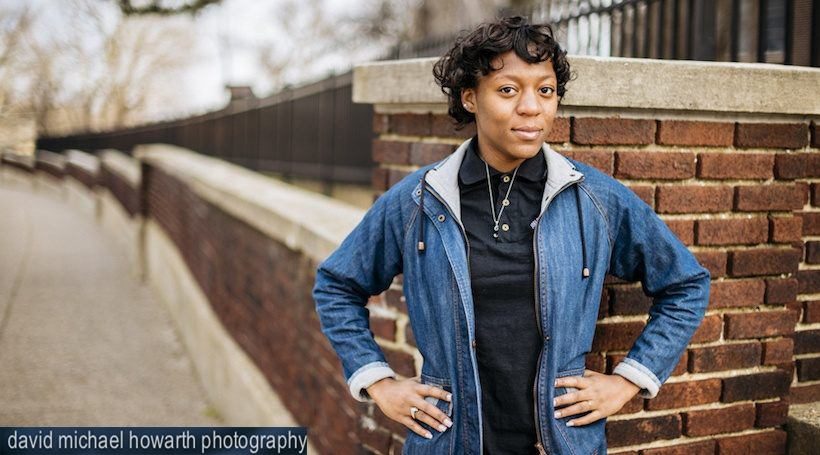Photography by David Michael Howarth
When Ja’Nayzia Morris was 15, she was called down to the principal’s office late one afternoon. And then her life was turned upside down.
“When I got there, my sister was already in the office crying,” says Morris, the oldest of seven children. The teen was told her mother had failed a drug test, and the siblings were immediately being placed in separate foster homes. Morris had no idea her mother had a drug problem; the news was a complete shock.
“I felt defeated,” she says. “I kept thinking that as the oldest I should have found a way to stop this from happening.”
Morris tried to manage high school while in foster care, “but I was always thinking, ‘How can I graduate with the mindset I’m in?’” she says. She connected with Homestretch, a program at Oaks Integrated Care in Mount Holly that mentors older children in foster care, especially those who are required to age out when they turn 21. “It was nice to finally get to talk about what I was going through. It felt like the world had been lifted off my shoulders.”
Homestretch assists teens and young adults in foster care with planning for the future, developing life skills and getting the tools they’ll need to live on their own. For many, says Anne Greenwood, director of child and family services at Oaks, the program’s caseworkers are the only adults and mentors in their lives.
“I don’t think their needs are radically different from other kids that age,” she says. “The difference is they don’t have the support network those other kids do. They can’t pick up the phone to call mom and dad and ask for a ride or ask them to help smooth out the rough patches when they make mistakes.”
“In some cases, we become that important relationship,” Greenwood continues. “Even though we’re not there all the time, we’re on call. We’re the one they’re going to call when they’re lost or broke or in trouble or upset about a relationship. We become both their formal and informal support system.”
For Morris, the Oaks program became her support system – particularly her mentor, who she says is like a big sister to her.
“We get to go places I’ve never gone before and talk about stuff I normally wouldn’t be comfortable talking about,” Morris says. “It’s not a judgmental setting, and it always feels real, not like they’re reading off a script or following protocol or something. Everything flows; it’s confidential and it’s productive.”
Morris says she’s been able to visit colleges, museums and participate in a number of creative arts activities because of Oaks. But Homestretch doesn’t stop there – the program also provides youth with transitional housing in Ventnor, says Greenwood.
Young people can live in the shared apartments until they officially age out at 21. The living situation is considered “unsupervised,” but there are staff members available to help residents.
“There is one clinical case manager who focuses on interpersonal issues, communication, decision-making or whatever emotional issues crop up as they’re trying to figure out how to live independently,” Greenwood says.
“Then there’s a life skills worker who helps with things like vocational skills, education, physical healthcare. The life skills worker is the person who helps you write a résumé and fill out a job application. The clinical case manager might sit down and talk to you about why it’s hard to show up for your job.”
Greenwood says that while it’s important to teach basic life skills and help kids learn how to live independently, the best thing she and her staff can do is model healthy relationships and just simply be there for the young people in their care.
“We often counsel them to reach out to the people who were important to them in the past – people who can help and provide moral support,” Greenwood says.
“That’s often what these youth lack. They’ve been moved so many times that relationships are harder to sustain. That becomes the catalyst for a lot of the challenges they encounter. So we try to fill that gap. The pressure is on the closer they get to that deadline to make sure they have the kind of financial support they need to move on, that you’ve taught them everything you can in terms of life skills and that you have modeled good relationships for them. In a way it’s like a parent launching a child. You feel like you’re pumping everything into them you can in those last months, because you want them to be successful.”
Greenwood has seen a lot of success stories as a result of the Homestretch program, but the shared apartments can only house six youth at a time, which doesn’t begin to cover the needs of foster kids in the region. In Glassboro, the nonprofit Robins’ Nest has a similar program called On My Own, which can house up to 30 individuals. Still, says Erin Klein, program director of On My Own, homelessness is a big issue for kids between 18 and 21 who are still in the system.
“Saying they’re homeless doesn’t mean they’re sleeping on a park bench, but that they don’t have a stable place to live,” Klein says. “They’re staying with friends, moving around. We try to find them housing, but it’s always a challenge. When you don’t have stable housing, it’s almost impossible to hold down a job or take care of yourself.”
Morris knows that feeling well – she’s lived at a group home, her cousin’s, her uncle’s, and now, at her grandmother’s.
“But the program was the one thing that didn’t change,” Morris says. “That made it a lot easier because I had something to fall back on, some kind of foundation even when everything else was changing.”
Klein says another huge hurdle for teens who feel they’ve been abandoned – sometimes more than once – is building relationships based on trust.
“Not every youth is like this,” she says, “but on average they really struggle with building trust.”
“For most of them, parental rights have been terminated. Sometimes they were adopted and ended up back in the system, or they got kicked out at 18. So trust is a huge, huge hurdle. Even with us coming in to help them, they don’t believe we’re for real.”
For Morris, that feeling of trust was apparent as soon as she walked through the doors at Oaks. Part of it was an instant connection with her mentor, who’s close to her in age, Morris says. “A lot of the problems I have, she’s gone through them, so it’s nice to have somebody who’s been through it already.”
Morris says her mentor also prepared her for the next big step: college. Morris is set to graduate in June and head to a four-year university to major in African-American studies.
“I talk to my mentor about college, too,” Morris adds. “She can’t fully prepare me, but she explains some things, like about time management and different strategies to get through the semester more easily.”
Overall, Morris says her time at Oaks Integrated Care has had a “tremendous impact” on her – and her future. “I’m at ease right now, and I don’t think I would be there without it,” she says.
“I’m mentally and emotionally calm and ready for the future,” she adds. “In a weird way, I’m grateful this happened. This all made me strong and resilient. I can adapt to anything. It made me dependable, responsible. It made me a provider for my siblings. Now, I’m the strong one.”
Victoria Mier contributed to this article.














